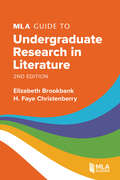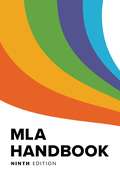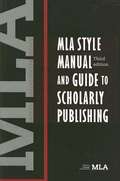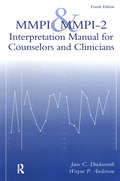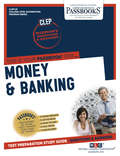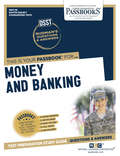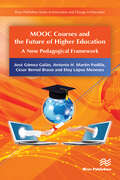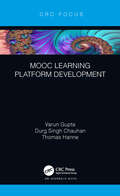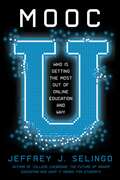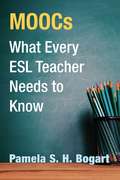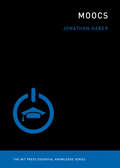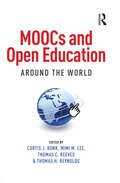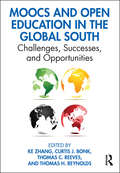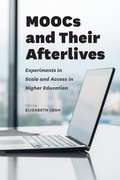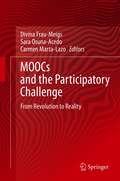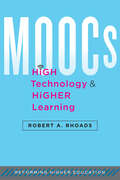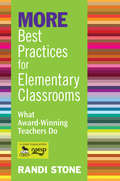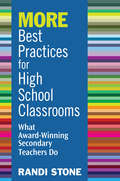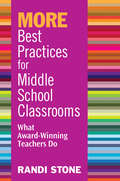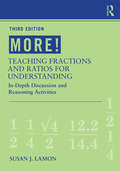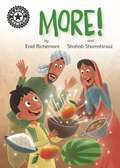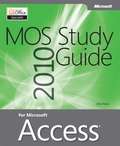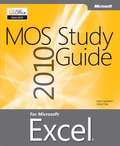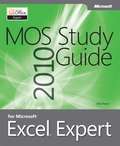- Table View
- List View
MLA Guide to Undergraduate Research in Literature (MLA GUIDES)
by Elizabeth Brookbank H. Faye ChristenberryWhat makes a good research topic in a literature class? What does your professor mean by "peer-reviewed" sources? What should you do if you can't find enough material? This approachable guide walks students through the process of research in literary studies, providing them with tools for responding successfully to course assignments.Written by two experienced librarians, the guide introduces the resources available through college and university libraries and explains how to access the ones a student needs. It focuses on research in literature, identifying relevant databases and research guides and explaining different types of sources and the role each plays in researching and writing about a literary text. But it also contains helpful information for any student researcher, describing strategies for searching the web to find the most useful material and offering guidance on organizing research and documenting sources with MLA style.Extensively updated and revised, the second edition emphasizes digital resources that can be accessed remotely, offers critical thinking strategies for evaluating sources, and includes more information on writing about audiovisual as well as written works.This book contains an introduction and the chapters "Starting the Research Process," "Searching Your Library Discovery System or Catalog," "Searching Subject-Specific Databases," "Searching the Internet," "Finding Reviews," "Using Contextual Primary Sources," "Finding Background Information," "Managing Sources and Creating Your Bibliography," and "Guides to Research in Literature Written in English" as well as a bibliography of sources for studying literature in English and a glossary of terms.
MLA Handbook (MLA Handbook)
by The Modern Language Association of AmericaThe ninth edition works as both a textbook and a reference guide. Focusing on source evaluation, it features a wealth of visual examples and updated advice on punctuation and grammar, footnotes and endnotes, annotated bibliographies, and paper formatting. An all-in-one resource that makes MLA style easier to learn and use, the MLA Handbook includes: Expanded, in-depth guidance on creating works-cited-list entries using the MLA template of core elements that explains what each core element is, where to find it in various sources, and how to style it. A new, easy-to-follow explanation of in-text citations. A new chapter containing recommendations for using inclusive language. A new appendix with hundreds of sample works-cited-list entries by publication format, including books, databases, websites, YouTube videos, interviews, and more. Updated guidelines on avoiding plagiarism.
MLA Style Manual and Guide to Scholarly Publishing (3rd Edition)
by The Modern Language Association of AmericaA complete, up-to-date guide for writing scholarly texts, documenting research sources, submitting manuscripts to publishers, and dealing with legal issues surrounding publication.
MMPI And MMPI-2: Interpretation Manual For Counselors And Clinicians
by Jane C. Duckworth Wayne P. AndersonFirst published in 1995. Routledge is an imprint of Taylor & Francis, an informa company.
MODERN LITERATURE II (1700-1850), M.A. ENGLISH (Previous) PAPER IV, School Of Distance Education, Andhra University
by M. V. RAJA KUMAR Mrs Ila Rao Mrs K. Lakshmi Devi Prof L.S.R. Krishna Sastry Mrs T. PadmaThis is the prescribed material for students pursuing MA English for previous year (first year) Paper 4 Modern Literature 2 (1700-1850)
MONEY & BANKING: Passbooks Study Guide (College Level Examination Program Series (CLEP) #Vol. Clep-25)
by National Learning CorporationThe College Level Examination Program (CLEP) enables students to demonstrate college-level achievement and earn college credit in various subject areas based on knowledge acquired through self-study, high school and adult courses, or through professional means. The CLEP Money & Banking Passbook® prepares you by sharpening knowledge of the skills and concepts necessary to succeed on the upcoming exam and the college courses that follow. It provides a series of informational texts as well as hundreds of questions and answers in the areas that will likely be covered on your upcoming exam.
MONEY AND BANKING: Passbooks Study Guide (DANTES Subject Standardized Tests (DSST) #Vol. Clep-25)
by National Learning CorporationThe DSST Subject Standardized Tests are comprehensive college and graduate level examinations given by the Armed Forces, colleges and graduate schools. These exams enable students to earn college credit for what they have learned through self-study, on the job, or by other non-traditional means. The DSST Money & Banking Passbook® prepares candidates for the DSST exam, which enables schools to award credit for knowledge acquired outside the normal classroom environment. It provides hundreds of questions and answers in the areas that will likely be covered on your upcoming exam, including but not limited to: the Federal Reserve; inflation; national and international financial policies; commercial banking; and more.
MOOC Courses and the Future of Higher Education: A New Pedagogical Framework
by José Gómez Galán Antonio H. Padilla César Bernal BravoDuring the last decades, our society is witnessing an authentic revolution that, in a dizzying manner has deeply influenced, modified, and transformed the way of life of human beings. This constant and unstoppable revolution is transmuting all areas of our life: social, cultural, personal, labor, economic, training, etc. This new society is characterized by a high generation of knowledge and the constant and fluid processing of information. In this macro-context, the MOOC phenomenon emerged. MOOC (Massive Open Online Courses) courses are based on the principles of massive, free access to all materials and resources offered online. This new didactic path can be constituted in an innovative techno-social tendency, especially oriented in the panorama of Higher Education to stimulate university improvement, open opportunities at the same time for education and training or, simply, derive towards a new business model for the universities. In addition to being an entry point for the popularization of science and knowledge, the future possibilities are enormous and are being studied in all their various dimensions. Many initiatives as a result have been developed to implement this new form of education. MOOC Courses and the Future of Higher Education presents the latest research theories and current examples of MOOC courses practices in Higher Education. The chapters represent an extensive assortment of interpretations and practices examples of MOOC courses, across areas as varied as teaching methodologies, instructional innovations, educational technology, etc. This work is structured in three sections, the first one covers the university institution in the knowledge society, the second analyzes the MOOC training proposals, and the third discusses the future role of MOOCs. Technical topics discussed in the book include: The Virtualization of Teaching in Higher EducationTraining and Professional Development at the e-UniversityTaxonomy of MOOCsMOOC: Strengths and WeaknessesMOOCs and the Scientific Community: Challenges and InnovationMOOC PlatformsDirectory of MOOC ResourcesMOOC: Reflections of the Future
MOOC Learning Platform Development
by Thomas Hanne Varun Gupta Durg Singh ChauhanThe work presented in this book is based on empirical study undertaken as a case study to understand the challenges faced in massively open online course (MOOC) based learning and experimentation to understand the challenges for presenting theoretical and practical courses. The book proposes a flexible online platform. This solution provides flexibility in distance learning processes including course enrollment, learning, evaluation, and outcome of degrees. The proposed system not only gives students freedom to choose their courses in accordance with their needs but also use earned credit towards online degrees of any university of their choice.
MOOC U: Who Is Getting the Most Out of Online Education and Why
by Jeffrey J. SelingoMOOC U. explains why you should sign up for massive open online course (MOOC) and how you can get the greatest benefit from the courses. It does so by telling a story--the story of a single MOOC: University of Virginia Professor Ed Hess's "Grow to Greatness."<P> Higher education expert and award-wining author Jeffrey J. Selingo captures in four perspectives--the student's, the professor's, the university's, and the online course provider's--why today's average MOOC student can benefit tremendously from MOOCs, if they only know a bit about how to navigate the MOOC universe. MOOC U. provides a path to success for the six million and rising students who have signed up for a free online course.<P> A few years ago, Massive Open Online Courses (MOOCs) were heralded as higher education's savior. They would provide free, high quality education to remote villages around the world and those shut out of world-class universities. That remains a compelling vision, but one that is at odds with the hopes and plans of the majority of people who have signed up for a MOOC since 2011. Most of them are college graduates using MOOCs as a supplement to formal classroom learning and a tool for professional development. For these students, learning to use MOOCs as an instrument for learning, more like a textbook, rather than a replacement for college provides rich opportunities and immediate rewards.<P> The problem is that there are no guidebooks for prospective MOOC students like the hundreds that exist for the bricks-and-mortar world of college. MOOC U. is meant to be that guidebook: an explanation of the confusing web of MOOC players, the far-flung classmates, the professors, and most of all, how to determine quality in this new ecosystem. By following one MOOC course, the book lays out the issues and challenges of MOOCs through the personal stories of the people in the action.
MOOCs (Kindle Single): What Every ESL Teacher Needs to Know
by Pamela S. Bogart"We have an opportunity as ESL teachers to help our students plug in to what MOOCs can offer today: a supplementary space in which to develop vocabulary and text-based conversational skills and to learn foundational content in domains of interest at an individual pace in a non-threatening, low-stakes environment." --- Pamela S.H. Bogart In this e-single, Bogart, an instructor at the University of Michigan's English Language Institute, explains the ins and outs of MOOCs, particularly (but not exclusively) those that can support language learning. She explains the various types of MOOCs and their pedagogical benefits and shows how MOOCs can aid in the language learning process and offer students a more richly textured blended learning experience. The text concludes with tips for creating and designing a MOOC. Essentially, this short ebook answers many of the questions today's teachers might have about, not only whether to use MOOCs in the classroom, but whether they should create one. The book seeks to provide answers to: *What is a MOOC? *How can my students best use MOOCs? *What if I am asked to or decide to create a MOOC? Each section includes an Exploration Task that invites readers to deepen their personal understanding of and experience with MOOCs.
MOOCs (The MIT Press Essential Knowledge series)
by Jonathan HaberEverything you always wanted to know about MOOCs: an account of massive open online courses and what they might mean for the future of higher education.The New York Times declared 2012 to be “The Year of the MOOC” as millions of students enrolled in massive open online courses (known as MOOCs), millions of investment dollars flowed to the companies making them, and the media declared MOOCs to be earth-shaking game-changers in higher education. During the inevitable backlash that followed, critics highlighted MOOCs' high dropout rate, the low chance of earning back initial investments, and the potential for any earth-shaking game change to make things worse instead of better. In this volume in the Essential Knowledge series, Jonathan Haber offers an account of MOOCs that avoids both hype and doomsaying. Instead, he provides an engaging, straightforward explanation of a rare phenomenon: an education innovation that captures the imagination of the public while moving at the speed of an Internet startup.Haber explains the origins of MOOCs, what they consist of, the controversies surrounding them, and their possible future role in education. He proposes a new definition of MOOCs based on the culture of experimentation from which they emerged, and adds a student perspective—missing in most MOOC discussion. Haber's unique Degree of Freedom experiment, during which he attempted to learn the equivalent of a four-year liberal arts degree in one year using only MOOCs and other forms of free education, informs his discussion.Haber urges us to avoid the fallacy of thinking that because MOOCs cannot solve all educational challenges they are not worth pursuing, and he helps us understand what MOOCs—despite their limitations—still offer the world. His book is required reading for anyone trying to sort out the competing claims, aspirations, and accusations that color the MOOC debate.
MOOCs and Open Education Around the World
by Thomas C. Reeves Curtis J. Bonk Mimi M. Lee Thomas H. ReynoldsAs new digital forms of formal and informal learning proliferate, there is an increasing need to better understand how people in different regions of the world are implementing massive open online courses (MOOCs) and other forms of open educational resources (OERs). Educators, researchers, politicians, and numerous other stakeholders want to grasp what the outcomes of these initiatives are and how they can be improved. Ongoing e-learning developments related to both technology and pedagogy have pushed institutions and organizations to grapple with issues of accreditation, credentialing, quality standards, innovative assessment, and learner motivation and attrition, among other areas of concern. In response, MOOCs and Open Education Around the World explores and illuminates unique implementations of MOOCs and open education across regions and nations. The book also focuses on the various opportunities as well as the dilemmas presented in this rapidly evolving age of technology-enabled learning. What are the different delivery formats, interaction possibilities, assessment schemes, and business models? What are the key controversies or issues that must be discussed and addressed? This edited collection explains MOOCs and open education trends and issues in a variety of contexts, shares key research findings, and provides practical suggestions and recommendations for the near future.
MOOCs and Open Education in the Global South: Challenges, Successes, and Opportunities
by Thomas C. Reeves Ke Zhang Thomas H. Reynolds Curt BonkWith e-learning technologies evolving and expanding at high rates, organizations and institutions around the world are integrating massive open online courses (MOOCs) and other open educational resources (OERs). MOOCs and Open Education in the Global South explores the initiatives that are leveraging these flexible systems to educate, train, and empower populations previously denied access to such opportunities. Featuring contributors leading efforts in rapidly changing nations and regions, this wide-ranging collection grapples with accreditation, credentialing, quality standards, innovative assessment, learner motivation and attrition, and numerous other issues. The provocative narratives curated in this volume demonstrate how MOOCs and OER can be effectively designed and implemented in vastly different ways in particular settings, as detailed by experts from Asia, Latin America, the Middle East, Africa, the Pacific/Oceania, and the Caribbean. This comprehensive text is an essential resource for policy makers, instructional designers, practitioners, administrators, and other MOOC and OER community stakeholders.
MOOCs and Their Afterlives: Experiments in Scale and Access in Higher Education
by Elizabeth LoshA trio of headlines in the Chronicle of Higher Education seem to say it all: in 2013, “A Bold Move Toward MOOCs Sends Shock Waves;” in 2014, “Doubts About MOOCs Continue to Rise,” and in 2015, “The MOOC Hype Fades.” At the beginning of the 2010s, MOOCs, or Massive Open Online Courses, seemed poised to completely revolutionize higher education. But now, just a few years into the revolution, educators’ enthusiasm seems to have cooled. As advocates and critics try to make sense of the rise and fall of these courses, both groups are united by one question: Where do we go from here? Elizabeth Losh has gathered experts from across disciplines—education, rhetoric, philosophy, literary studies, history, computer science, and journalism—to tease out lessons and chart a course into the future of open, online education. Instructors talk about what worked and what didn’t. Students share their experiences as participants. And scholars consider the ethics of this education. The collection goes beyond MOOCs to cover variants such as hybrid or blended courses, SPOCs (Small Personalized Online Courses), and DOCCs (Distributed Open Collaborative Course). Together, these essays provide a unique, even-handed look at the MOOC movement and will serve as a thoughtful guide to those shaping the next steps for open education.
MOOCs and the Participatory Challenge: From Revolution to Reality
by Divina Frau-Meigs Sara Osuna-Acedo Carmen Marta-LazoThis book reports on a rather unique European experience, the pioneering ECO project for Social MOOCs (Massive Open Online Courses) and recapitulates the whole three-year process. It provides a critical perspective on the future of MOOCs in Europe and provides several comparisons with other existing models and platforms. The book contains chapters that address the major issues connected to MOOC design and implementation. The first 8 chapters cover large issues that extend beyond the ECO project experience, such as creative industries and trans-literacy; management and implementation; learning environments and platforms; dissemination; pedagogical models; interactivity and agility; gamification; evaluation; and business models. The last 3 chapters hone in on narrowly focused topics such as mobility, knowledge transfer and peer to peer evaluation. The specificities of this on-going project (funded by the EU) are: a unique collaborative pedagogy, an intercultural process (6 languages), and focus on intercreativity, the multiplying impact of e-teachers (the community of participants that was empowered to create more than 50 new MOOCs), accessibility and gamification. The book will be of interest due to its holistic approach to MOOCs and its assessment of their opportunities and their limitations. Many issues are explored and contribute to deeper understanding of the phenomenon and its transformative capacities for education and learning.
MOOCs, High Technology, and Higher Learning (Reforming Higher Education: Innovation and the Public Good)
by Robert A. RhoadsThe first book to explore the rise of MOOCs through a social science lens.In MOOCs, High Technology, and Higher Learning, Robert A. Rhoads places the OpenCourseWare (OCW) movement into the larger context of a revolution in educational technology. In doing so, he seeks to bring greater balance to increasingly polarized discussions of massively open online courses (MOOCs) and show their ongoing relevance to reforming higher education and higher learning.Rhoads offers a provocative analysis of a particular moment in history when cultural, political, and economic forces came together with evolving teaching and learning technologies to bring about the MOOC. He argues persuasively that the OCW and MOOC movements have had a significant impact on the digitalization of knowledge and that they have helped expand the ways students and teachers interact and develop ideas collaboratively. He also critically analyzes the extensive media coverage of MOOCs while examining empirical studies of MOOC content delivery, the organizational system supporting the OCW/MOOC movement, and faculty labor concerns.Too often, technology advocates champion the MOOC movement as a solution to higher education’s challenges without recognizing the pedagogical, social, and economic costs. MOOCs, High Technology, and Higher Learning challenges many of the democratic claims made by MOOC advocates, pointing to vast inequities in the ways MOOCs are presented as an alternative to brick-and-mortar access for low-income populations. This book offers a clear-eyed perspective on the potential and peril of this new form of education.
MORE Best Practices for Elementary Classrooms: What Award-Winning Teachers Do
by Randi B. StoneIn this sequel to Randi Stone's Best Classroom Practices, award-winning elementary teachers showcase their best strategies for classroom management, instruction, involving parents, and making inclusion work.
MORE Best Practices for High School Classrooms: What Award-Winning Secondary Teachers Do
by Randi B. StoneOutstanding high school teachers share award-winning practices for managing classrooms and using technology, and for teaching science, mathematics, language arts, social studies, music, art, and physical education.
MORE Best Practices for Middle School Classrooms: What Award-Winning Teachers Do
by Randi B. Sofman"There is a little something for everyone."—David Callaway, Eighth-Grade Language Arts TeacherRocky Heights Middle School, Highlands Ranch, CO"Although there are many books that provide lessons and units for various levels, the lessons in this book are very well written and provide more than just the unit instructions."—Diane Smith, School CounselorSmethport Area School District, PABest practices BY middle school teachers, FOR middle school teachers!Best-selling author Randi Stone brings together a collection of best classroom practices by award-winning teachers from schools throughout the United States to inspire new and experienced middle school teachers with time-tested ideas.MORE Best Practices for Middle School Classrooms is packed with ready-to-go lessons and units written by teachers who have used these ideas successfully in their own classrooms. Each lesson or strategy includes recommended grade levels, clear objectives, a listing of relevant national or state standards, materials lists, and easy-to-follow directions and tips. Readers will find ideas for:Managing effective classrooms, using technology, and assessing studentsTeaching in science, mathematics, language arts, and social studiesEngaging students in music, art, and physical educationLearn how some of the best teachers in the nation reach their middle school students—with best practices from the teachers themselves!
MORE! Teaching Fractions and Ratios for Understanding: In-Depth Discussion and Reasoning Activities
by Susan J. LamonMore is not an answer key but a resource that provides the scaffolding for the groundbreaking approach to fraction and ratio instruction presented in its companion text, Teaching Fractions and Ratios. Keeping the focus on the reasoning needed to properly understand and teach rational numbers, More shows teachers how to engage in powerful ways of thinking so that they can, in turn, enhance the mathematical education of their students. Like its companion text, More has been heavily expanded and reorganized, including even more student work, templates for key manipulatives, and an emphasis on applications to everyday life. Based on the content chapters in Teaching Fractions and Ratios, each chapter includes: In-depth Discussions of selected problems and their solutions. Supplementary Activities and a collection of challenging problems involving fractions. Praxis Preparation Questions geared to the content of each chapter.
MORE!: Independent Reading 11 (Reading Champion #299)
by Enid RichemontWhen Sanjay is given a magic bowl that produces food by a kind goddess, he and his family need never be hungry again. Then the greedy Maharajah takes the bowl from him. But the Maharajah cannot control the magic and the food keeps coming... This traditional tale clearly echoes with 'The Magic Porridge Pot'.Reading Champion offers independent reading books for children to practise and reinforce their developing reading skills.Fantastic, original stories are accompanied by engaging artwork and a reading activity. Each book has been carefully graded so that it can be matched to a child's reading ability, encouraging reading for pleasure.The Key Stage 2 Reading Champion Books are suggested for use as follows:Independent Reading 11: start of Year 3 or age 7+Independent Reading 12: end of Year 3 or age 7+Independent Reading 13: start of Year 4 or age 8+Independent Reading 14: end of Year 4 or age 8+Independent Reading 15: start of Year 5 or age 9+Independent Reading 16: end of Year 5 or age 9+Independent Reading 17: start of Year 6 or age 10+Independent Reading 18: end of Year 6 or age 10+
MOS 2010 Study Guide for Microsoft® Access®
by John PierceDemonstrate your expertise with Microsoft Access by earning a MOS 2010 certification. This Study Guide is designed to help you practice and prepare for Exam 77-885: Access 2010, and features:Full objective-by-objective review Procedures and hands-on practice tasks Ready-made, downloadable practice files Exam-discount Use the in-depth exam prep, practice, and review to help advance your proficiency with Access 2010--and earn the credential that proves it! NOTE: This same content is also available as part of the MOS 2010 Study Guide for Microsoft Word Expert, Excel Expert, Access, & SharePoint Exams (ISBN 9780735657885)
MOS 2010 Study Guide for Microsoft® Excel®
by Joan Lambert Joyce CoxDemonstrate your expertise with Microsoft Excel by earning a MOS 2010 certification. This Study Guide is designed to help you practice and prepare for Exam 77-882: Excel 2010, and features:Full objective-by-objective review Procedures and hands-on practice tasks Ready-made, downloadable practice files Exam-discount Use the in-depth exam prep, practice, and review to help advance your proficiency with Excel 2010--and earn the credential that proves it! NOTE: This same content is also available as part of the MOS 2010 Study Guide for Microsoft Word, Excel, PowerPoint, and Outlook Exams (ISBN 9780735648753)
MOS 2010 Study Guide for Microsoft® Excel® Expert
by John PierceDemonstrate your expertise with Microsoft Excel by earning a MOS 2010 certification. This Study Guide is designed to help you practice and prepare for Exam 77-888: Excel 2010 Expert, and features:Full objective-by-objective review Procedures and hands-on practice tasks Ready-made, downloadable practice files Exam-discount Use the in-depth exam prep, practice, and review to help further advance your proficiency with Excel 2010--and earn the expert-level credential that proves it! NOTE: This same content is also available as part of the MOS 2010 Study Guide for Microsoft Word Expert, Excel Expert, Access, & SharePoint Exams (ISBN 9780735657885)
